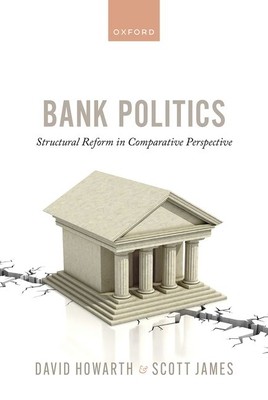
- We will send in 10–14 business days.
- Author: David Howarth
- Publisher: Oxford University Press, USA
- ISBN-10: 0192898604
- ISBN-13: 9780192898609
- Format: 16.2 x 24.1 x 2.9 cm, kieti viršeliai
- Language: English
- SAVE -10% with code: EXTRA
Reviews
Description
The problem of banks being 'too big to fail' was the defining regulatory issue of the global financial crisis. However, attempts to tackle the problem by separating retail banking from higher risk trading activities - known as structural reform - proved to be highly divisive and contributed to significant regulatory divergence. In this book, David Howarth and Scott James explain this variation by examining the politics of bank structural reform across six key jurisdictions: the United States, the European Union, the United Kingdom, France, Germany, and the Netherlands. Integrating political economy and public policy approaches, they develop a novel 'comparative financial power' framework to analyse how financial industry influence is mediated by two factors: first, whether bank lobbying is unified and centralized (cooperative financial power) or divided and fragmented (competitive financial power); and second, policy makers' use of venue shifting to depoliticize contentious
policy issues.
EXTRA 10 % discount with code: EXTRA
The promotion ends in 22d.19:42:21
The discount code is valid when purchasing from 10 €. Discounts do not stack.
- Author: David Howarth
- Publisher: Oxford University Press, USA
- ISBN-10: 0192898604
- ISBN-13: 9780192898609
- Format: 16.2 x 24.1 x 2.9 cm, kieti viršeliai
- Language: English English
The problem of banks being 'too big to fail' was the defining regulatory issue of the global financial crisis. However, attempts to tackle the problem by separating retail banking from higher risk trading activities - known as structural reform - proved to be highly divisive and contributed to significant regulatory divergence. In this book, David Howarth and Scott James explain this variation by examining the politics of bank structural reform across six key jurisdictions: the United States, the European Union, the United Kingdom, France, Germany, and the Netherlands. Integrating political economy and public policy approaches, they develop a novel 'comparative financial power' framework to analyse how financial industry influence is mediated by two factors: first, whether bank lobbying is unified and centralized (cooperative financial power) or divided and fragmented (competitive financial power); and second, policy makers' use of venue shifting to depoliticize contentious
policy issues.


Reviews